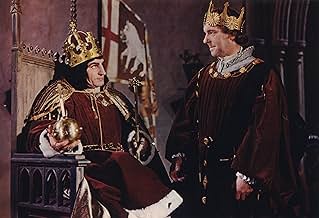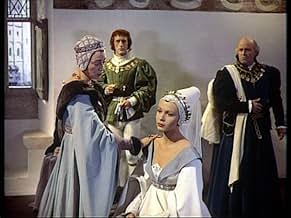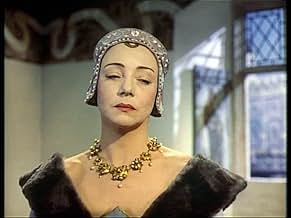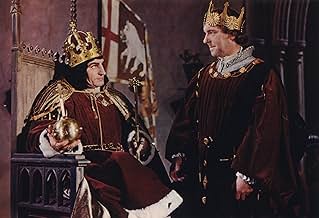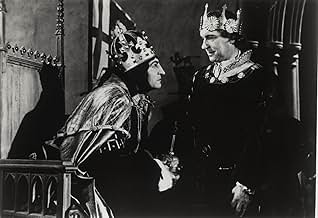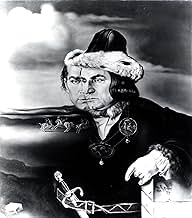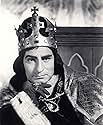Richard III
- 1955
- Tous publics
- 2h 41m
IMDb RATING
7.3/10
5.6K
YOUR RATING
A tale of the wicked deformed King and his conquests, both on the battlefield and in the boudoir.A tale of the wicked deformed King and his conquests, both on the battlefield and in the boudoir.A tale of the wicked deformed King and his conquests, both on the battlefield and in the boudoir.
- Nominated for 1 Oscar
- 9 wins & 3 nominations total
Wallace Bosco
- Monk
- (as Wally Bascoe)
Featured reviews
In many ways this is a stage-bound adaptation and with Olivier in the lead role this is not a bad thing. After all he was one of the theatre greats of the twentieth century.
In Richard III, Olivier constantly turns and talks to the audience with his devilish plans to ascend to the throne of England. Aided by his cousin the Duke of Buckingham (Ralph Richardson) he soon replaces King Edward IV (Cedric Hardwicke), rids himself of his other brother George (John Gielgud) and dispatches his young nephews to the tower and then brings their tender lives to a premature end.
The deformed, despicable hunchback even seduces the widow of a man he murdered for his own purposes, Lady Anne (Claire Bloom).
Once Richard ascends to the throne he finds that he has to do battle with a rival who also stakes a claim to the hollow crown.
This is a chance to see Olivier, still in his pomp speaking the Bard's verse. Unfortunately the accompanying music is too bombastic and Olivier's death scene verges on the ham.
In Richard III, Olivier constantly turns and talks to the audience with his devilish plans to ascend to the throne of England. Aided by his cousin the Duke of Buckingham (Ralph Richardson) he soon replaces King Edward IV (Cedric Hardwicke), rids himself of his other brother George (John Gielgud) and dispatches his young nephews to the tower and then brings their tender lives to a premature end.
The deformed, despicable hunchback even seduces the widow of a man he murdered for his own purposes, Lady Anne (Claire Bloom).
Once Richard ascends to the throne he finds that he has to do battle with a rival who also stakes a claim to the hollow crown.
This is a chance to see Olivier, still in his pomp speaking the Bard's verse. Unfortunately the accompanying music is too bombastic and Olivier's death scene verges on the ham.
It's quite a gap that Laurence Olivier covers between his portrayal of heroic Henry V and the evil Richard III. But he certainly does cover it well.
In fact this production boasts the talents of five knighted thespians in its cast, Olivier as Richard, John Gielgud as Clarence, Ralph Richardson as Buckingham, Cedric Hardwicke as Edward IV and Stanley Baker as the Earl of Richmond. That is probably some kind of record.
Once seen you will not forget the heavily made up Olivier with a shylock type nose and hunchbacked form. Unlike in Henry V and in Hamlet the title character's soliliquys are delivered straight to the audience rather than in voice-over. I think Olivier like Shakespeare wanted to emphasize the evilness of Richard as opposed to the tormenting doubts that Henry and Hamlet suffer. No doubts here, he's got his evil course well planned and he's very matter of factly telling his audience what's in store.
Of course when Shakespeare wrote this he was gearing up the Tudor dynasty propaganda machine. Stanley Baker's Earl of Richmond becomes Henry VII grandfather of the Queen whose patronage Shakespeare enjoyed. It was in Tudor family interest to blacken Richard's name to support their own dynastic claims. There have been several plausible theories put forth to claim the murders of Edward V and his brother were done by others.
One guy who in all the stories about Richard III who gets a whitewash is the Duke of Clarence. As portrayed by John Gielgud, Clarence is an innocent sacrificed in Richard's march for the throne. Actually Clarence was quite the schemer himself. He was in communication with Louis XI of France looking for aid in some plotting he was doing. Edward IV overlooked an incredible amount of treachery with him.
One very big flaw is that the film opens with Edward IV being restored to the throne again in 1471 and he has his son with him. Edward IV died in 1483 and the sons have not aged a mite. I believe they were 12 and 9 when they were put to death in the Tower of London in 1483. I'm surprised Olivier had that in his film.
Still and all it's a fabulous production and one should never miss a chance of seeing all that acting nobility in one film.
In fact this production boasts the talents of five knighted thespians in its cast, Olivier as Richard, John Gielgud as Clarence, Ralph Richardson as Buckingham, Cedric Hardwicke as Edward IV and Stanley Baker as the Earl of Richmond. That is probably some kind of record.
Once seen you will not forget the heavily made up Olivier with a shylock type nose and hunchbacked form. Unlike in Henry V and in Hamlet the title character's soliliquys are delivered straight to the audience rather than in voice-over. I think Olivier like Shakespeare wanted to emphasize the evilness of Richard as opposed to the tormenting doubts that Henry and Hamlet suffer. No doubts here, he's got his evil course well planned and he's very matter of factly telling his audience what's in store.
Of course when Shakespeare wrote this he was gearing up the Tudor dynasty propaganda machine. Stanley Baker's Earl of Richmond becomes Henry VII grandfather of the Queen whose patronage Shakespeare enjoyed. It was in Tudor family interest to blacken Richard's name to support their own dynastic claims. There have been several plausible theories put forth to claim the murders of Edward V and his brother were done by others.
One guy who in all the stories about Richard III who gets a whitewash is the Duke of Clarence. As portrayed by John Gielgud, Clarence is an innocent sacrificed in Richard's march for the throne. Actually Clarence was quite the schemer himself. He was in communication with Louis XI of France looking for aid in some plotting he was doing. Edward IV overlooked an incredible amount of treachery with him.
One very big flaw is that the film opens with Edward IV being restored to the throne again in 1471 and he has his son with him. Edward IV died in 1483 and the sons have not aged a mite. I believe they were 12 and 9 when they were put to death in the Tower of London in 1483. I'm surprised Olivier had that in his film.
Still and all it's a fabulous production and one should never miss a chance of seeing all that acting nobility in one film.
That "Richard III" is one of the all-time great acting performances is hard to argue with. In the title role, Sir Laurence Olivier manages to be rousing and hate-inducing, menacing and amusing, often all at once. He was the world's greatest stage actor of his time, and Shakespeare was the world's greatest stage writer. So how do they do on the movie screen?
Quite well. Because "Richard III," like "Patton" or "Scarface," is essentially a one-man show, and Olivier was the best Shakespearean actor of his time or since, we are in good hands. As a director (and uncredited co-writer), Olivier telescopes the action on screen in such a way as to negate the necessary stageiness of Shakespeare's text. He moves us the audience from one scene to another by pulling back a curtain and nodding to us to come closer, as if we were an old friend. He yells some lines, then coos others, his vocal dynamics challenging even seasoned readers of the play in terms of what he chooses to accent and what he does not. Finally, he finds the ample stores of humor Shakespeare gave this, one of his darker plays.
"A sweeter and a lovelier gentleman...the spacious world cannot again afford," Richard says of one man he killed, and Olivier invests moments like this with a firm tongue in cheek. While wooing that man's wife (strictly for political gain), he actually draws a sword when presenting himself as the widow's new suitor, telling her to plunge it into him if she won't be his bride. She tells him he's a liar. "Then never man was true!" Richard shouts, and Olivier as he says this rolls his eyes shamelessly, like a silent-screen matinée idol. I can't watch that scene without laughing; it's a Mel Brooks moment.
The film does move slowly, despite Olivier's trims. Entire scenes get cut out, yet the first act is drawn on for nearly an hour with the help of some dialogue brought in from another Shakespeare play. Surely Olivier could have set more up as part of the opening text narrative, and gotten down to business with that famous opening soliloquy.
A worse fault is the woodenness of some of the actors, like the ones who play Catesby, Brackenbury, and especially Lord Hastings. It doesn't help that they don't get the same chance to address the viewer that Olivier avails himself. Sir John Gielgud even seems lost playing a naive victim of Richard's complots. Seen to better advantage are Claire Bloom as the woman Richard woos, Michael Gough as a murderer, and Patrick Troughton as the nasty child-killing nobleman Tyrell.
Ralph Richardson gives the second-best performance in the play as the Duke of Buckingham, a half-step behind Richard in guile and cruelty, but trying to catch up in his own cold-blooded way. It's funny to read here that Olivier wanted Orson Welles in the role. Welles would have seemed too crafty. Richardson makes a believable victim as well as conspirator. Also, you have to mention Pamela Brown's Mistress Shore, who has no lines (because Shakespeare wrote none for her) but manages in Olivier's direction to play a central role by currying the bedside favor of King Edward and of Hastings.
But Olivier of course is the only reason this movie is still watched. And he's worth watching as long as movies are seen. Yes, he may have won World War II making his movie version of "Henry V," and his "Hamlet" was when he became Hollywood's favorite emissary of high culture, but "Richard III" is still the thing to catch the conscienceless of the king, his moment of highest dungeon and merriest perversity. It's movies like this one that remind us why acting can be a noble profession, even for those who aren't knighted for their excellence in it.
Quite well. Because "Richard III," like "Patton" or "Scarface," is essentially a one-man show, and Olivier was the best Shakespearean actor of his time or since, we are in good hands. As a director (and uncredited co-writer), Olivier telescopes the action on screen in such a way as to negate the necessary stageiness of Shakespeare's text. He moves us the audience from one scene to another by pulling back a curtain and nodding to us to come closer, as if we were an old friend. He yells some lines, then coos others, his vocal dynamics challenging even seasoned readers of the play in terms of what he chooses to accent and what he does not. Finally, he finds the ample stores of humor Shakespeare gave this, one of his darker plays.
"A sweeter and a lovelier gentleman...the spacious world cannot again afford," Richard says of one man he killed, and Olivier invests moments like this with a firm tongue in cheek. While wooing that man's wife (strictly for political gain), he actually draws a sword when presenting himself as the widow's new suitor, telling her to plunge it into him if she won't be his bride. She tells him he's a liar. "Then never man was true!" Richard shouts, and Olivier as he says this rolls his eyes shamelessly, like a silent-screen matinée idol. I can't watch that scene without laughing; it's a Mel Brooks moment.
The film does move slowly, despite Olivier's trims. Entire scenes get cut out, yet the first act is drawn on for nearly an hour with the help of some dialogue brought in from another Shakespeare play. Surely Olivier could have set more up as part of the opening text narrative, and gotten down to business with that famous opening soliloquy.
A worse fault is the woodenness of some of the actors, like the ones who play Catesby, Brackenbury, and especially Lord Hastings. It doesn't help that they don't get the same chance to address the viewer that Olivier avails himself. Sir John Gielgud even seems lost playing a naive victim of Richard's complots. Seen to better advantage are Claire Bloom as the woman Richard woos, Michael Gough as a murderer, and Patrick Troughton as the nasty child-killing nobleman Tyrell.
Ralph Richardson gives the second-best performance in the play as the Duke of Buckingham, a half-step behind Richard in guile and cruelty, but trying to catch up in his own cold-blooded way. It's funny to read here that Olivier wanted Orson Welles in the role. Welles would have seemed too crafty. Richardson makes a believable victim as well as conspirator. Also, you have to mention Pamela Brown's Mistress Shore, who has no lines (because Shakespeare wrote none for her) but manages in Olivier's direction to play a central role by currying the bedside favor of King Edward and of Hastings.
But Olivier of course is the only reason this movie is still watched. And he's worth watching as long as movies are seen. Yes, he may have won World War II making his movie version of "Henry V," and his "Hamlet" was when he became Hollywood's favorite emissary of high culture, but "Richard III" is still the thing to catch the conscienceless of the king, his moment of highest dungeon and merriest perversity. It's movies like this one that remind us why acting can be a noble profession, even for those who aren't knighted for their excellence in it.
It was Olivier's production of HENRY V that led to his showing what a creative producer/director of film he could be. His Oscar came from his "Freudian" interpretation of HAMLET. But I suspect that most people would say his greatest Shakespearean film (both as star and director) was this one - his performing the greatest villainous role in the English language, King RICHARD III.
One can carp about the historical accuracy of RICHARD III from now until doomsday. That monarch was attacked by two of England's leading literary figures: Sir Thomas More (who is also a political/religious martyr), and Shakespeare. In comparison only two literary figures of any consequence ever defended him: Horace Walpole (the 18th Century diarist and letter writer - best recalled, if at all, for his Gothic novel THE CASTLE OF OTRANTO) and Josephine Tey, the dramatist and mystery novelist who wrote a detective story, THE DAUGHTER OF TIME, to defend him. More, a Tudor government official (eventually Lord Chancellor, before he fell from official favor) was close to one of Richard's foes, Cardinal Morton, and so accepted Morton's stories about Richard's murderous guilt. He wrote a HISTORY OF RICHARD III. Shakespeare, to keep official favor with the court, had to placate it with it's glorification of Henry VII, and vilification of the monarch who Henry defeated and killed. Walpole, a student of 18th Century skepticism and scholarship, wrote SOME QUESTIONS REGARDING RICHARD III, which point by point debated the so-called crimes Richard committed. Walpole, however, also was convinced that the pretender, Perkins Warbeck (executed 1499) was actually the younger one of the two Princes in the Tower. Tey used her gifts as a mystery novelist to examine the case as an intellectual puzzle for a recuperating Inspector Adam Grant in the novel. But she is basing her views on work done up to about 1935 or so, especially the Life of Richard III by the exploration historian Sir Clement Markhams. Today we realize more information from contemporary documents have come out. The balanced view is that Richard is truly a usurper (but this was par for the political course of 1483, especially after all of the blood and plotting of the War of the Roses). However, his actual planning of the deaths of Henry VI and his son, of George, Duke of Clarence, of Lords Rivers, Grey, and Hastings, and of his two nephews has never been conclusively shown (it could have been his one time ally the Duke of Buckingham, or his enemy Henry, Earl of Richmond/Henry VII, or even Cardinal Morton!).
But without a dramatist or novelist of Shakespeare's stature, we are left with only Shakespeare's Richard - the finest example of a Machiavellian monarch on stage. So it is that the role can never be played poorly, unless by some stupid concept thrown in by a director (witness Richard Dreyfus's having to play Richard as an over-the-top homosexual in THE GOODBYE GIRLS due to Paul Benedict's idiot scheme of production). An example of the universality of the role was shown by Sir Ian McKellan's version a decade ago, set in the 1930s, suggesting Richard as a potential Fascist leader of Great Britain (complete with his "Hog" symbol used in place of a swastika). That film version too was wonderful.
Olivier is ably assisted by his cast of Richardson, Guilgud, Baker, Hardwicke, Bloom, and the others who show what happens when a power-hungry monster is allowed to divide and conquer his opponents, and then seize total power. There are moments in the film where Olivier's real personality comes out in frightening intensity. One is where he is playing with the two nephews, and when one teasingly refers to his humpback, the camera and lighting shows an intense hatred and anger rising from his eyes (the boys, by the way, notice it and cower). The other is the point when Richard decides to rein in his erstwhile ally in his rise, Buckingham (Richardson) who is at court to present his request for some payment for his assistance. Richard shouts impatiently "I'm not in the giving mood today!", and crashes his scepter down narrowly missing Buckingham's hand. The Duke notices this, and soon is off on his ill-fated rebellion.
RICHARD III was a first rate film - in my opinion it may be the best filmed version of a Shakespeare play made before 1980. It is regrettable that,whatever the reason, Olivier never directed another Shakespearean film (he planned at least one I would have been interested in - CORIOLANUS - which never got beyond the stage production). So enjoy the three we have, and his performances in the films OTHELLO and AS YOU LIKE IT, and the television versions of his THE MERCHANT OF VENICE and KING LEAR. It's all we'll ever have.
One can carp about the historical accuracy of RICHARD III from now until doomsday. That monarch was attacked by two of England's leading literary figures: Sir Thomas More (who is also a political/religious martyr), and Shakespeare. In comparison only two literary figures of any consequence ever defended him: Horace Walpole (the 18th Century diarist and letter writer - best recalled, if at all, for his Gothic novel THE CASTLE OF OTRANTO) and Josephine Tey, the dramatist and mystery novelist who wrote a detective story, THE DAUGHTER OF TIME, to defend him. More, a Tudor government official (eventually Lord Chancellor, before he fell from official favor) was close to one of Richard's foes, Cardinal Morton, and so accepted Morton's stories about Richard's murderous guilt. He wrote a HISTORY OF RICHARD III. Shakespeare, to keep official favor with the court, had to placate it with it's glorification of Henry VII, and vilification of the monarch who Henry defeated and killed. Walpole, a student of 18th Century skepticism and scholarship, wrote SOME QUESTIONS REGARDING RICHARD III, which point by point debated the so-called crimes Richard committed. Walpole, however, also was convinced that the pretender, Perkins Warbeck (executed 1499) was actually the younger one of the two Princes in the Tower. Tey used her gifts as a mystery novelist to examine the case as an intellectual puzzle for a recuperating Inspector Adam Grant in the novel. But she is basing her views on work done up to about 1935 or so, especially the Life of Richard III by the exploration historian Sir Clement Markhams. Today we realize more information from contemporary documents have come out. The balanced view is that Richard is truly a usurper (but this was par for the political course of 1483, especially after all of the blood and plotting of the War of the Roses). However, his actual planning of the deaths of Henry VI and his son, of George, Duke of Clarence, of Lords Rivers, Grey, and Hastings, and of his two nephews has never been conclusively shown (it could have been his one time ally the Duke of Buckingham, or his enemy Henry, Earl of Richmond/Henry VII, or even Cardinal Morton!).
But without a dramatist or novelist of Shakespeare's stature, we are left with only Shakespeare's Richard - the finest example of a Machiavellian monarch on stage. So it is that the role can never be played poorly, unless by some stupid concept thrown in by a director (witness Richard Dreyfus's having to play Richard as an over-the-top homosexual in THE GOODBYE GIRLS due to Paul Benedict's idiot scheme of production). An example of the universality of the role was shown by Sir Ian McKellan's version a decade ago, set in the 1930s, suggesting Richard as a potential Fascist leader of Great Britain (complete with his "Hog" symbol used in place of a swastika). That film version too was wonderful.
Olivier is ably assisted by his cast of Richardson, Guilgud, Baker, Hardwicke, Bloom, and the others who show what happens when a power-hungry monster is allowed to divide and conquer his opponents, and then seize total power. There are moments in the film where Olivier's real personality comes out in frightening intensity. One is where he is playing with the two nephews, and when one teasingly refers to his humpback, the camera and lighting shows an intense hatred and anger rising from his eyes (the boys, by the way, notice it and cower). The other is the point when Richard decides to rein in his erstwhile ally in his rise, Buckingham (Richardson) who is at court to present his request for some payment for his assistance. Richard shouts impatiently "I'm not in the giving mood today!", and crashes his scepter down narrowly missing Buckingham's hand. The Duke notices this, and soon is off on his ill-fated rebellion.
RICHARD III was a first rate film - in my opinion it may be the best filmed version of a Shakespeare play made before 1980. It is regrettable that,whatever the reason, Olivier never directed another Shakespearean film (he planned at least one I would have been interested in - CORIOLANUS - which never got beyond the stage production). So enjoy the three we have, and his performances in the films OTHELLO and AS YOU LIKE IT, and the television versions of his THE MERCHANT OF VENICE and KING LEAR. It's all we'll ever have.
Many great actors made their names with this Richard, and it turns out to be Olivier's greatest Shakepearean role as well. He captures the whole production coiling his way around the Crown of England: his asides to us through the camera are lovely. They say all actors love to play a villain. Well, it works for me.
The movie is beautiful, rich; the costumes are awesome; and the dialogue, of course, is wonderful. He patches in that great speech from Henry VI, part 3: "Why, I can smile, and murder whiles I smile . . .": and the movie wouldn't be right without it.
The other actors, Britain's elite of the time, seem to be tyrannized by the boss; and the text should have been edited better, because if you don't know the play and practically the whole history you'll get lost. Not to worry, though; the subplots here aren't really important (but they should be), and the thundering battle at the end will leave you satisfied. Special mention of Sir William Walton's music, the vibrant colors, and of course, England itself.
The movie is beautiful, rich; the costumes are awesome; and the dialogue, of course, is wonderful. He patches in that great speech from Henry VI, part 3: "Why, I can smile, and murder whiles I smile . . .": and the movie wouldn't be right without it.
The other actors, Britain's elite of the time, seem to be tyrannized by the boss; and the text should have been edited better, because if you don't know the play and practically the whole history you'll get lost. Not to worry, though; the subplots here aren't really important (but they should be), and the thundering battle at the end will leave you satisfied. Special mention of Sir William Walton's music, the vibrant colors, and of course, England itself.
Did you know
- TriviaMichael Gough got his part (Dighton, the first murderer) by making a fuss to his fellow actor friends about only established stars getting cameo parts and leaving nothing for struggling actors like him. One night he got a phone call, and a voice said "You've been stirring it, haven't you? Right little shit." Gough demanded to know, "Who is this?" only to be stunned by the response, "It's Larry", which of course was Sir Laurence Olivier. Olivier was just having some fun at Gough's expense, had taken on-board his criticisms and was ringing to offer him the part of one of the murderers in this movie. When asked which one he wanted to play, Gough quickly said "Whichever one has the most lines", and he got his wish. Olivier arranged matters so that Gough's scenes were split over several days, instead of all being done in one day, so that Gough would maximize his per diem fee.
- GoofsIn the scene when Richard tells King Edward of Clarence's supposed treason, two monks are singing hymns from a large book: their lips are not only out of sync with their singing, but with each other.
- Quotes
Richard III: I'll drown more sailors than the mermaid shall,/ I'll play the orator as well as Nestor,/ Deceive more slyly than Ulysses could,/ And, like a Sinon, take another Troy./ I can add colours to the chameleon, /Change shapes with Proteus for advantages, /And set the murderous Machiavel to school./ Can I do this,and cannot get a crown?/Tut, were it farther off,/ I'll pluck it down.
- Crazy creditsMost of the film's credits are shown at the end. The opening credits show only the title of the film, William Shakespeare's name, and the names of the main actors.
- Alternate versionsReleased in Great Britain at 155 minutes; some of the prints released in the USA are 139 minutes.
- ConnectionsFeatured in Great Acting: Laurence Olivier (1966)
Details
- Release date
- Country of origin
- Languages
- Also known as
- 3. Richard
- Filming locations
- La Mancha, Castilla-La Mancha, Spain(Bosworth Field scenes)
- Production companies
- See more company credits at IMDbPro
- Runtime2 hours 41 minutes
- Color
Contribute to this page
Suggest an edit or add missing content



